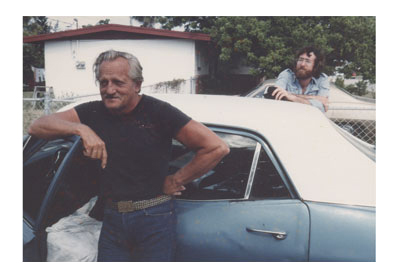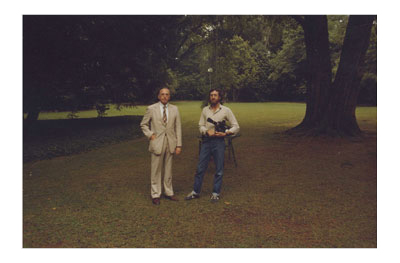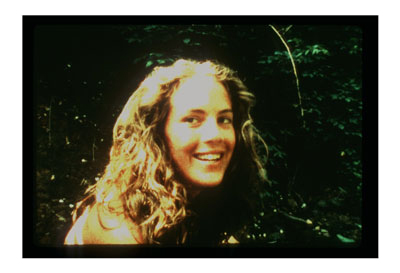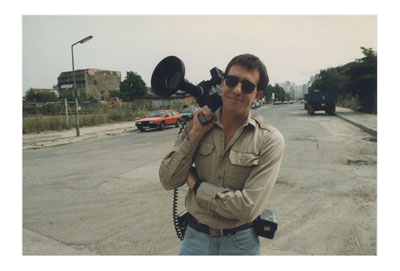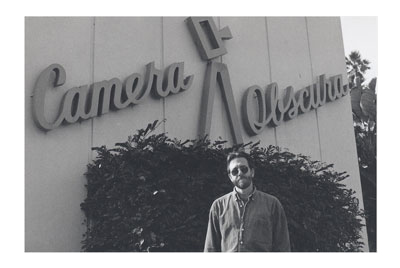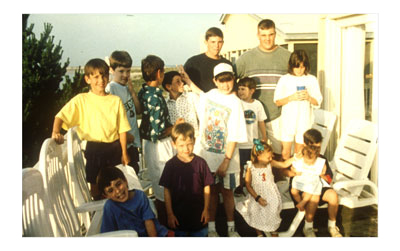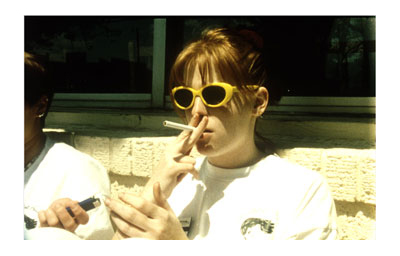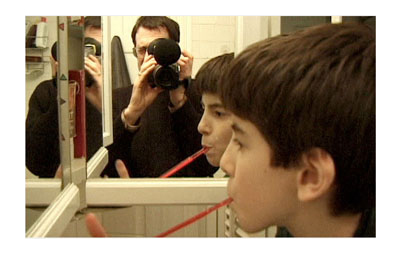DocumentaMadrid to hold a retrospective and a Master Class with filmmaker Ross McElwee
.jpg)
-
The filmmaker will give audiences insight into the creative process for his next film, which he first is announcing for the festival, Sherman's Redux.
-
The retrospective will bring such titles as Sherman's March, Photographic Memory, Bright Leaves and Six O'Clock News to the Spanish Film Archives for the first time.
DocumentaMadrid will be putting on a retrospective of the renowned American filmmaker Ross McElwee, who will visit Madrid for the 15th edition of the City of Madrid’s Documentary Film Festival to be held from May 3 to 13, 2018.
The director of DocumentaMadrid, David Varela, points out: "together with McElwee, we will dig down into the emotional psyche of this philosopher of images, who broke with a kind of cinéma vérité and created a universe in which reflecting on the entity of images, the transmutation of intimacy in art, and the analytical poignancy towards oneself, take on a new value: that of the exceptionality of a filmmaker who alters and reconfigures his personality while creating a film that resonates universally."
The XV edition of DocumentaMadrid is rendering tribute to this artist with screenings of the films that have made him an ironic and unique filmmaker known throughout the world: Charleen, Space Coast, Six O’Clock News, Backyard, Sherman’s March, Something to Do with the Wall, Time Indefinite, Bright Leaves and Photographic Memory. These films make up a self-referential film diary and clearly show how the documentary narrative and film essay have evolved.
Filmoteca Española, an institution belonging to the Ministry of Education, Culture and Sports and one of the venues for DocumentaMadrid, will host both this full retrospective and the Master Class entitled "Sherman's Redux - A Work in Progress" to be held at the Cine Doré on Friday, May 4 at 5:30 p.m., registration for which will be free of charge by signing up on the DocumentaMadrid website, starting on April 23.
The name for this event is an allusion to Sherman's March, the film that earned him the Grand Jury Prize at Sundance in 1986 and that he now wants to take back up to make into his new film, with help from the public joining him at the Cine Doré. Sherman's Redux will be McElwee's twelfth film. All of them have taken part in major festivals around the world, from Berlin to Venice, by way of Rotterdam, Cannes, Quito and Sydney, and have contributed significantly to a renewal in non-fiction film.
Faced with the years-long crusade he had with Hollywood producers, the filmmaker went back to his private archive and selected footage that he will make public for the first time, and on which he will “look for suggestions from the audience as to how to find my way out of this morass”, referring to his new film, Sherman's Redux. McElwee is hoping to find answers to questions like: “How has my life changed in 32 years? And life in my homeland of the American South, where Sherman’s March was filmed? And in the US as a whole?” Covering these issues will be the seed for this new project, which he is announcing as part of his visit to DocumentaMadrid.
According to David Varela, "Ross McElwee's film work is solidly built upon a place that is constantly mutating between self-referential essay, confessional diary and home movies. In a highly personal and very enjoyable body of work, it combines the unstable objectivity of the documentary with the stamp of biographical subjectivity."
Films in the retrospective
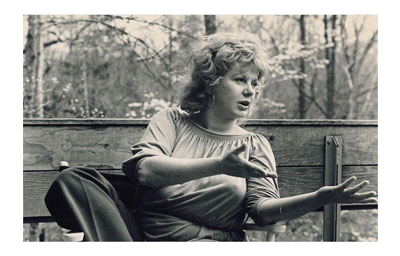
Charleen
60’
United States, 1977
The wise and flamboyant Charleen Swansea, McElwee’s friend and former high school teacher in Charlotte, North Carolina, is a born raconteur who can charm equally a classroom full of wary African American poetry students and a Bible studies group of genteel southern white women.
Space Coast
90’
United States, 1979
Co-directed with Michel Negroponte.Michel Negroponte and McElwee follow three residents of Cape Canaveral, Florida, several years after the phasing out of the Apollo moon missions: a salty newspaper reporter who has witnessed 1,600 consecutive launches; an out-of-work maintenance man who now leads a motorcycle gang; and the owner of a small construction company who sidelines as the clown-host of a local kids television show. Negroponte and McElwee transcend the “God, guns, and family” clichés of small town America.
Backyard
40’
United States, 1984
McElwee depicts a microcosm of southern society: his brother, an aspiring medical student; his father, a surgeon; and the African Americans with whom they come into contact; the family cook, a beekeeper, and the staff of the local country club, who can scarcely contain their anger at the casual racism they confront every day. Also casting a shadow over the film are the deaths of McElwee’s mother and brother, traumas that his family would prefer to leave unexamined.
Sherman’s March
155’
United States, 1988
Winner of the Grand Jury Prize at Sundance.
What begins as an attempt to retrace the path taken by General Sherman and his Union soldiers in their devastating sweep through the secessionist South, becomes, in the words of McElwee’s sister, "a brokenhearted filmmaker’s clumsy chivalrous quest to find love". In his most celebrated film, McElwee points up the paradox of the inquisitive documentarian: “He’s gotten scalded by life, his lover left him, and so he retreats into the mollusk shell of his camera and pokes his head out now and then".
Something to do with the wall
88’
United States, 1990
Co-directed with Marilyn Levine.
A meditation on the absurd vagaries of history: Growing up in 1950s America, McElwee and Marilyn Levine were brought up on a steady diet of Cold War paranoia. So were the West Germans they began filming in 1986. But as the Berlin Wall came down three years later and hard-line Communism collapsed with it, the filmmakers and their subjects were suddenly faced with a new world order.
Six o’clock News
103’
United States and United Kingdom, 1996
Catastrophe, disaster, tragedy: if it bleeds, it leads. In an attempt to go beyond the stock figures of the evening news—victims of earthquake, disease, and murder—McElwee travels from town to town filming these human interest stories over a period of several years. When terrible things happen, how do such people go on? And how can McElwee’s own newborn son be brought into such a bizarre and frightening world?
Time Indefinite
114’
United States, 1993
The death of a father and a grandmother, a marriage and the birth of a son. As McElwee observes, 'everything begins and ends with family.' And in the life of a family, as in everything else, it is those seemingly inconsequential moments that often turn out to be profoundly important, such as the moment when McElwee's father picks up his son's movie camera, and the moments when McElwee decides to put it down. Filled with black humor and deepest pathos, Time Indefinite is a magisterial chronicle of place and character, capturing the fullest range of human emotion.
Bright Leaves
105’
United States and United Kingdom, 2003
Part mystery, part ethical inquiry, and part home movie, this brilliant and frequently hilarious documentary explores the cruel twist of fate that has led some to make their fortunes from tobacco, and others to die from it. McElwee returns home to the tobacco farming country of North Carolina to investigate the history of his great-grandfather, who developed the formula for Bull Durham tobacco, which could made him very rich.
Photographic Memory
87’
United States and France, 2011
Ross McElwee finds himself in frequent conflict with his son, a young adult who seems addicted to and distracted by the virtual worlds of the internet. To understand his son's life, McElwee travels back to St. Quay-Portrieux in Brittany for the first time in decades to retrace his own journey into adulthood. An essay on the passing of time, the praxis of photography and film, and the digital versus analog divide.
Biofilmography of Ross McElwee
Ross McElwee was born in 1947 to a southern family in Charlotte, North Carolina (United States). He studied creative writing and took photography classes, which led to his first job as a wedding photographer in Brittany, France.
Back in the United States, he studied filmmaking with Richard Leacock and Ed Pincus, pioneers in the cinéma verité movement, "a new way of making films, to eliminate the film crew" which in McElwee's words, "loses some technical polish, but it's much more intimate and less intimidating to your subjects. It allows you to shoot with the autonomy and flexibility of a photojournalist. " He was also strongly influenced by Hawkes' autobiographical film, which advocates for intruding on his personal life in depicting his own surroundings.
Although McElwee began his career filming documentaries for DA Pennebaker in Washington DC and for John Marshall in Namibia, he soon began directing his own documentaries in 1976. In them, his family and problems in the southern United States take a central role.
That kind of intimate storytelling can be seen right in his first film, Charleen (1977), where he insightfully portrays his friend and former high school teacher. Another portrait, this one about three residents in the now defunct station of Cape Canaveral, is the subject of his second film, Space Coast (1979), co-directed with Michel Negroponte. In 1981, he collaborated once again with Michel Negroponte on Resident Exile.
McElwee goes back to solo directing on his first autobiographical film, Backyard (1984), in which he delves into his family history: his father the surgeon, his brother, the African Americans with whom they come into contact and through all of them, he himself as a character; he performs a scrupulous "autopsy", in his own words, to rehabilitate some version of life that he feels this reality deserves.
But it was for his best-known film, Sherman's March (1986), that he won the award for Best Documentary at the Sundance Film Festival. The film transcended what documentary film had been understood to be at the time by dealing with a specific history about the Civil War in the southern United States, a purely ethnographic and sociopolitical issue, and by establishing a metaphor with his own sentimental misunderstandings.
As viewers, we get to witness the changes in McElwee's personal life, which would lead him to direct with his wife Marilyn Levine in 1990 Something to Do with the Wall, about the end of Communism, another example of how his filmmaking intersperses his personal life and political and social events from the time.
Highly-influenced by one of his professors and author of Six O'Clock News, John Hawkes, McElwee shot a film with the same name in which he breaks with the voice-over and criticizes the media's way of storytelling by interacting directly with victims of tragedy in order to tell the personal story behind them. In so doing, he managed to lend them a voice after its premiere at Sundance and its broadcast on national television. A more personal story, Time Indefinite (1983) was also released at festivals and in theaters across the United States.
With Bright Leaves (2003), he took the story of his own great-grandfather to the Directors' Fortnight in Cannes, and with Photographic Memory (2011), his son's life, this time to the Venice Film Festival. It is his strained relationship with his son that will lead him back to the Brittany where began his career, and will see him recover file footage from that time, with which he will reflect on the passing of time and the filmmaking process, just as will happen at the upcoming master class he will be leading at DocumentaMadrid.
McElwee is a college professor at Harvard and has been featured in retrospectives at the MOMA, the Art Institute of Chicago, the American Museum of the Moving Image in New York and the Documentary Film Museum in Lussas, France.
You can access material and the Press Kit here
To arrange reporting / interviews, please contact:
Beatriz Asín
DocumentaMadrid Communication Team
Las Espigadoras. prensa@documentamadrid.com (0034) 637 941 980
You can follow us on our social networks: Facebook / Twitter /Instagram
And comment on all festival-related activity with the hashtag #Documenta2018



 DocumentaMadrid
DocumentaMadrid
